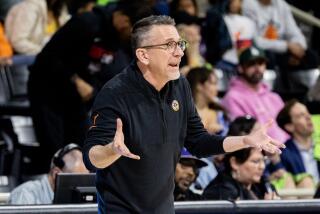Miller Is Out of Olympics : She Thinks She Can Play, Officials Don’t
- Share via
COLORADO SPRINGS, Colo. — What is generally considered the greatest career in the history of women’s basketball may have ended Tuesday when Cheryl Miller flew home from the U.S. Olympic camp, amid an unseemly argument over whose idea it had been.
Team officials, trying to soft-pedal the news, announced that Miller had been “released . . . from the training camp site due to medical circumstances.” The chief medical officer said Miller had “withdrawn” and the head of the U.S. basketball federation said that it had been the result of a “joint discussion” between Miller and Coach Kay Yow.
The federation even issued a release containing a quote from Miller (“I’m very disappointed about being released from the team but sometimes the mind says one thing and the body says another.”) suggesting that she concurred with the decision.
“She’s been cut from the team,” said Miller’s father, Saul, angrily, from his Riverside office.
“She can play. That’s it.
“Cheryl is not making any statements at this time. I’m looking into the situation. I don’t want to give any other statement right now. We’ve just got to look at the situation.
“She was cut. She was cut for whatever reason.”
Under questioning, officials conceded that Miller had, indeed, been cut, because they thought her surgically repaired right knee wasn’t ready.
“I can understand some people would take the stand, that with everything she’s done for women’s basketball and everything she’s meant, that we should take her on a leg-and-a-half,” Yow said. “She can play 10 minutes and not practice every time.
“But I’m representing every college coach in the country. If I had a player of my own out here, healthy, completely busting it every practice, every scrimmage, and they then kept a player over my player who couldn’t practice every time, I don’t think it would sit too well with me.
“In my mind, we’re never going to know if we’re going to have her or not. It’s best we know and get prepared.”
Miller first hurt the knee in a pickup game in Los Angeles in April, 1987. She underwent surgery at that time and was granted a waiver for the ’88 trials this spring. She participated in a mini-camp in Raleigh, N.C., in June and joined the team here Aug. 1 when it began two-a-day drills.
Yow says Miller had only been able to participate in both drills on two or three of the first six days. Then Miller bumped knees during a drill Saturday morning.
“I think we were running a screening drill,” Yow said Tuesday. “She made contact with another person’s knee. Of course, she had on the brace but that’s when she hurt it.
“There was a lot of swelling in it. The doctors couldn’t assess it at the time, so they put a cast on it, padded it to get the swelling down.”
U.S. basketball officials say Miller was on crutches over the weekend, that she practiced Monday morning but didn’t show for the Monday afternoon drill, instead phoning the airlines to make her own reservation home. She was then reportedly convinced to stay for a team dinner Monday night, and a conference with Yow.
“I had said that by Aug. 1 we need to be able to go twice a day in practice and be full speed,” Yow said. “And if we’re not full speed by Aug. 1, then I think we have to take another direction.
“It’s difficult to make a selection to 12 players when some people are practicing once a day, some people can’t practice at all, other people are practicing twice a day.
“I’ve made the statement, what she could do on a basketball court, she could do it the best. But she’s limited. You’ve got healthy bodies here. We’ve got eight hard weeks--six before we start playing--of intense competition and practices.”
If this is to be it for Cheryl Miller’s career, it stands alone. She was a four-time All-American at USC and a three-time Naismith player of the year. She led the Trojans to an NCAA title and starred on the ’84 Olympic team that romped to the gold medal and the U.S. team--coached by Yow--that routed the Soviet Union twice in ‘86, in the World University and Friendship Games, the first time in 29 years the U.S. women had beaten a Soviet team.
More to Read
Go beyond the scoreboard
Get the latest on L.A.'s teams in the daily Sports Report newsletter.
You may occasionally receive promotional content from the Los Angeles Times.






